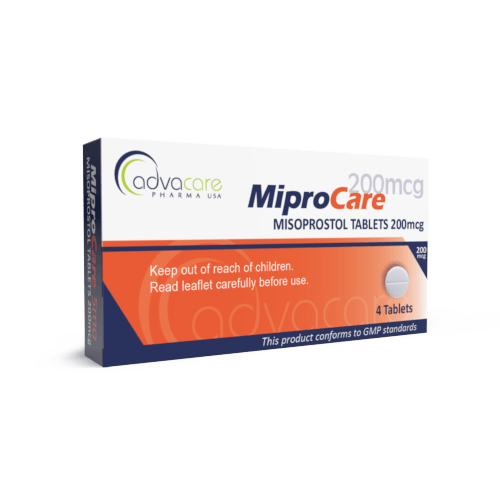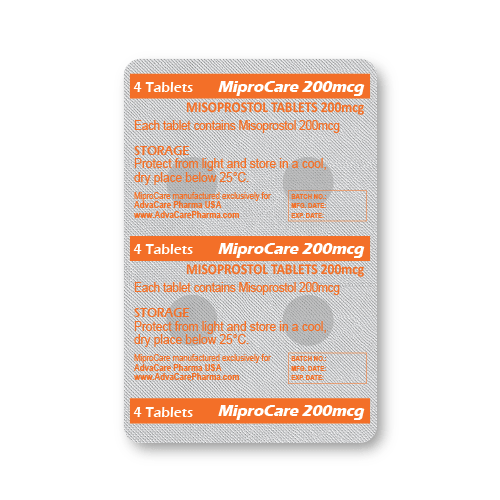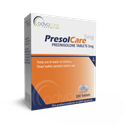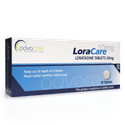- Home›
- Pharmaceuticals›
- Pharmaceutical Tablets›
- Misoprostol Tablets
Misoprostol Tablets
Dosage
Packaging
What is Misoprostol?
Active Ingredients: Misoprostol
Misoprostol Tablets are used to prevent gastric ulcers during treatment with non-steroidal anti-inflammatory drugs (NSAID), such as aspirin or naproxen. Misoprostol is also used to induce labor. This drug can be combined with mifepristone to end an early pregnancy in a medical abortion.
Misoprostol is sometimes used within a hospital setting in order to treat postpartum bleeding. Obstetric hemorrhage is a leading cause of maternal death in many countries.
It is crucial to note that the only FDA-approved indication for misoprostol is to prevent gastric ulcers.The use of misoprostol is subject to legal regulations in different countries. In some places, obtaining misoprostol without a prescription or using it outside approved medical contexts may be illegal.
Misoprostol is classified as a prostaglandin analog. When used for its gastrointestinal indications, it works by mimicking the action of natural gut-protective prostaglandins.
Misoprostol Tablets are produced with a dose of 200mcg. These tablets are packaged on blisters and available for distribution as a box of 4 tablets.
Misoprostol is listed on the World Health Organization’s List of Essential medicines for its use in uterine contractions.
AdvaCare Pharma is a producer and exporter of Misoprostol Tablets. This medication is manufactured in our factories in China, India, and the USA. We routinely inspect our production facilities to ensure our products meet quality and safety standards.
Why are we a top Misoprostol manufacturer?
AdvaCare Pharma is a trusted Misoprostol manufacturer committed to providing quality-assured, cost-effective pharmaceuticals for an ever-changing global market. Manufacturing a wide range of 200+ pharmaceutical products in tablet form, we ensure that all of our oral solid dosage forms adhere to stringent GMP standards.
We operate according to a unique "vested supplier-distributor relationship" business model, in which we tie our success in a market to that of our distributor. Such a model facilitates a closer relationship by working together to achieve pre-defined goals for market entry and expansion. As a Misoprostol manufacturer and global supplier, we implement unique strategies to ensure successful distribution.
Uses
What is Misoprostol used for?
It is used to treat and prevent gastric and peptic ulcers that may be caused by nonsteroidal anti-inflammatory drugs (NSAIDs) such as aspirin, ibuprofen, naproxen, celecoxib, diclofenac, or indomethacin.
In some regions, Misoprostol is used off-label in obstetrics and gynecology, such as to induce labor, to prevent or treat postpartum hemorrhage, or to induce a medical abortion in combination with other drugs.
How should Misoprostol Tablets be used?
This medication is intended to be taken orally. The tablets should be taken with food. When it is used to prevent ulcers, it is typically taken four times a day—with meals and at bedtime.
How should Misoprostol Tablets be stored?
It is recommended to keep this medication in its original packaging until use. The tablets should be kept at room temperature, at or below 25°C. The tablets should be stored in a place that is protected from moisture and heat. Keep this medication out of the reach of children and pets.
What dose should be taken?
Recommended dosage of Misoprostol may vary based on different medical conditions and age.
Adult Dosing Recommended dosage may vary based on different medical conditions:
- For the prevention of NSAID-associated ulcers (gastric and duodenal), the usual dose is 800mcg each day, divided and taken in 2-4 doses. Treatment should continue for at least 4 weeks, even if symptoms are relieved. Treatment can continue for up to 8 weeks. If the ulcer relapses, further courses can be given.
- For the prevention of gastrointestinal ulcers associated with NSAIDs, the usual dose is 100-200mcg taken 4 times per day. The tablets should be taken with a meal, and the last dose should be at bedtime. Treatment should continue for the duration of therapy with the NSAID.
- For the prevention of stress-induced ulcers (off-label), the usual dose is 100-200mcg, taken every 4-6 hours.
This drug is used off-label to addressing chronic constipation in refractory cases, aiding in cervical ripening and induction of labor for specific obstetric conditions, managing postpartum hemorrhage, and facilitating termination of pregnancy in the first trimester. It is important to note that the specifics of usage, including dosages and administration guidelines, are subject to legal regulations and may vary between countries.
Renal Dosing This medicine should be used with caution in patients with renal impairment.
The dosage is based on medical condition, response to treatment, age, and weight. Refer to a doctor or pharmacist for guidelines on dosage. Do not exceed what they advise.
Who can use Misoprostol?
Misoprostol Tablets can be given to adults, but caution is advised for specific groups of patients.
Pregnant The use of this drug for gastrointestinal prophylaxis of NSAID-associated ulcerations is contraindicated in pregnant women. Misoprostol is known to cause abortion (including incomplete), premature birth, uterine rupture, or birth defects when given to pregnant women.
Breastfeeding The benefits must be weighed against the risks when using the medicine in women who are breastfeeding. There is inadequate data available to evaluate the risks of harm for the nursing infant. There is a possible risk of decreased milk production but there is not enough data to confirm the risk.
Children Studies have not been conducted to establish safety and efficacy guidelines for the use of this medicine in pediatric patients.
Geriatric Studies have not been conducted to establish safety and efficacy guidelines for the use of this medicine in elderly patients.
Other warnings
For women in childbearing years, it is advised to conduct a pregnancy test before beginning therapy. It is also essential to confirm the effective use of contraception while taking this medication.
It is advised to use caution when giving this medication to patients with conditions that increase their risk of diarrhea, such as inflammatory bowel disease. Misoprostol should not be used concurrently with drugs that may cause diarrhea, such as magnesium antacids.
Caution is advised when using this drug in patients with cardiovascular disease, diabetes, renal impairment, or respiratory disease, as safety and efficacy guidelines have not been established.
Caution is also advised for female patients over the age of 35 who are heavy smokers.
There have been reports of bacterial infections after the use of this medicine. Toxic shock and septic shock have been associated with some of the infections.
This drug is not recommended for women in their childbearing years unless they have a high risk of developing an ulcer or ulcer complications. When treating female patients, it is advised to follow local regulations for consultation concerning the risks of this medication. When starting therapy, it is recommended for female patients to begin Misoprostol on the second or third day of the following normal menstrual cycle.
Side Effects
As with all pharmaceuticals, some unwanted effects can occur from the use of Misoprostol Tablets.
Common side effects include, but may not be limited to:
- diarrhea
- stomach cramps or pain
- headache
- nausea
- upset stomach
- flatulence
- vomiting
- chills
It is common to experience nausea, abdominal cramps, or diarrhea during the first few weeks of beginning treatment with Misoprostol.
These symptoms usually lessen in severity after a week. If these symptoms become severe or last longer than 8 days, it is advised to contact a doctor.
Contact a doctor if any of the following serious side effects occur:
- heavy or painful menstrual bleeding
- miscarriage or incomplete abortion
- severe, persistent diarrhea
- fever or other signs of an infection
- signs of an allergic reaction
- dehydration
- thromboembolism
- hypertension
For a comprehensive understanding of all potential side effects, consult a medical professional.
If any symptoms persist or worsen, or you notice any other symptoms, please call your doctor immediately.
Precautions
Do NOT use Misoprostol Tablets if:
- You are allergic to any of the ingredients.
- You are allergic or hypersensitive to other prostaglandins.
- You may have stomach cancer.
- You are pregnant or planning to become pregnant.
- You are breastfeeding.
Before treatment, consult your doctor regarding any medications you are taking to address potential drug interactions.This medicine may interact with drugs such as oxytocin or antacids. Antacids containing magnesium may worsen side effects such as diarrhea.
This medication may not be suitable for people with certain conditions, so it is important to consult with a doctor if you have any health conditions. Special considerations, such as dose adjustments, may be necessary for conditions such as:
- women in their reproductive years
- cardiovascular disease
- inflammatory bowel disease
- fetal macrosomia or grand multiparity (cervical ripening use only)
- cesarean section or uterine surgery (cervical ripening use only)
Driving or operating machinery should be avoided, as this medication may cause negative side effects that interfere with these abilities.
It is advised to avoid the use of alcohol or tobacco while taking misoprostol. Daily usage may increase the risk of stomach bleeding.
Misoprostol Tablets are not suitable for people under 18 years of age.
Consult a doctor before starting this medication if you are breastfeeding.
Do not use this medication if you are pregnant.
In the event of an unplanned pregnancy, stop taking this drug and inform a doctor as soon as possible. This drug can cause serious problems such as such as birth defects, premature birth, uterine rupture, uterine bleeding, miscarriage, or incomplete miscarriage.
When used for the prevention of gastric ulcers or other conditions, it may be necessary to perform a pregnancy test within 2 weeks of beginning treatment with this drug. While being treated with Misoprostol, it is essential to use effective birth control during therapy and for at least 1 month after stopping treatment.
This medicine should not be shared with any other person, even if they exhibit the same symptoms.
References
Misoprostol Dosage in the Prevention of Nonsteroidal Anti-inflammatory Drug-Induced Gastric and Duodenal Ulcers: A Comparison of Three Regimens
This research compared the effectiveness and tolerability of three misoprostol dosing regimens for the prevention of gastric and duodenal ulcers associated with long-term nonsteroidal anti-inflammatory drug (NSAID) therapy.
It is a multicenter, 12-week, randomized, double-blind, placebo-controlled, parallel, four-limb study. It included a total of 1623 patients, while 1197 of these met major accession and regimen-compliance criteria and completed the trial.
Patients were randomly assigned to one of four treatment groups: placebo four times daily; 200µg of misoprostol twice daily plus placebo twice daily; 200µg of misoprostol three times daily plus placebo once daily; and 200µg of misoprostol four times daily.
Upper gastrointestinal endoscopic examinations for ulcers were conducted after 4, 8, and 12 weeks of treatment. The safety and tolerability of the regimens were evaluated through monitoring of adverse events. In the placebo group, the incidence of gastric ulcers was 15.7%, and duodenal ulcers were 7.5%. The groups receiving misoprostol twice daily (8.1%), three times daily (3.9%), and four times daily (4%) had significantly lower rates of gastric ulcers compared to placebo. The incidence of duodenal ulcers was significantly lower in the groups receiving misoprostol twice daily, three times daily, and four times daily compared to placebo.
The conclusion of this study is that misoprostol, at doses of 200µg twice or three times daily, provides protection against gastric and duodenal ulcers in patients undergoing long-term NSAID therapy.

You might be interested in...
Why AdvaCare Pharma?
As an industry leader, we are aware of our responsibility to provide affordable and sustainable solutions to improve healthcare worldwide.











